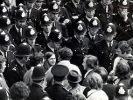Eye For Film >> Movies >> Bernadette: Notes On A Political Journey (2011) Film Review
She was the youngest ever female MP. She once punched the Home Secretary in the face. And she was shot seven times in an assassination attempt – it would be hard not to make an interesting film about the life and career of Bernadette Devlin McAliskey.
Doolan’s intimate and evocative documentary certainly captures the sense of the whirlwind that blew through British and Irish politics in the late Sixties. The Troubles had recently flared up and the Civil Rights movement, modelling itself on the mass protest tactics of Martin Luther King, was campaigning against the perceived discrimination against Northern Ireland’s Catholic minority.

Devlin – the long-haired, mini-skirted psychology student driven to join the movement by a fierce sense of injustice and quickly displaying the intelligence, articulacy and organisational flair to become one of its leading lights – was a poster girl for the times, a vivid contrast to the men in suits attempting to control a speeding train from Westminster or spouting bigotry from both sides of the sectarian divide.
The media was somewhat appalled to see a young Catholic girl laying down the law to them in no uncertain terms, but realised she was eminently quotable and made great TV. Epithets like ‘the Irish Joan of Arc’ and ‘Castro in a miniskirt’ did not seem like exaggerations as she outlined a political philosophy that combined committed Republicanism with an equally fervent belief that socialism was the only way to eliminate the inequalities of the system.
It won her passionate support – when she was elected MP for Mid-Ulster at the age of 21, it was with a 4,000 majority on the highest by-election turnout ever recorded – and her maiden speech garnered plaudits even from her political opponents. But she was never far from controversy, laying into Home Secretary Reggie Maudling verbally and physically when he suggested that the only shooting by British soldiers on Bloody Sunday had been in self-defence. And when she supported the ‘H Block’ hunger strikers, Loyalist paramilitaries were so incensed they sent an assassination squad after her.
That she survived the shooting is little short of a miracle, but she recounts it as matter-of-factly as all the other momentous events in her life in the series of head-to-head interviews that, together with extensive archive footage, form the core of the film.
For anyone old enough to remember the era the well-chosen clips are an instant jolt back to a time when the war on terror had a much more domestic feel to it. The images of water cannon and troops in riot gear on streets that could have been anywhere in Britain remind the viewer that this was relatively recent history. And the close ups of faces radiating hatred, anger and mutual incomprehension vividly convey the widespread feeling that the cycle of violence would never be broken.
The close-up interviews with Devlin – older and calmer, but still passionate about politics and the rights of her community – form a vivid contrast, as well as illustrating that the underlying problems of Northern Irish society have not simply vanished. She’s sceptical about the peace process, regarding power-sharing as exactly that; a cosy equal allocation of her country to representatives of organisations that are still “based on sectarianism and segregation”.
One could argue with that, of course – the lack of dissenting or even qualifying voices from her political contemporaries does give the film a somewhat unbalanced feel. It’s definitely her side of the story, but her views are clearly heartfelt and her move away from the national arena to the relative anonymity of community work suggests someone who’s not in politics simply because they love the sound of their own voice.
Occasionally a bit more flair and atmosphere in the telling would not have gone amiss. But Doolan does a good job of distilling an incredibly complex period of history down to a manageable length. And she knows when to step back and let her protagonist do the talking. In an era where politics now seems to be increasingly about image and compromise, it’s refreshing to see someone still not content with the way the world is and determined to see it change for the better.
Reviewed on: 14 Oct 2011

















